When Yang Dong-yang came across a public noticeboard advertising a job opportunity in West Germany in the summer of 1963, he was elated.
For the ambitious 24-year-old who arrived in Seoul from the countryside in search of work, opportunities for upward mobility were scarce.
“I always had dreams of making it big in the world since my childhood, but there was no means to achieve my dream in Korea. The country was very poor in the early 1960s, barely moving ahead after decades of colonial rule and the Korean War,” Yang told The Korea Herald at the German ambassador’s residence in Seoul on Sept. 27.
“Even Seoul was shoddy and decrepit, full of shantytowns, makeshift houses, beggars and orphans. It sounded like a marvelous opportunity to work in the advanced industrialized country that was West Germany. I signed up without any hesitation.”
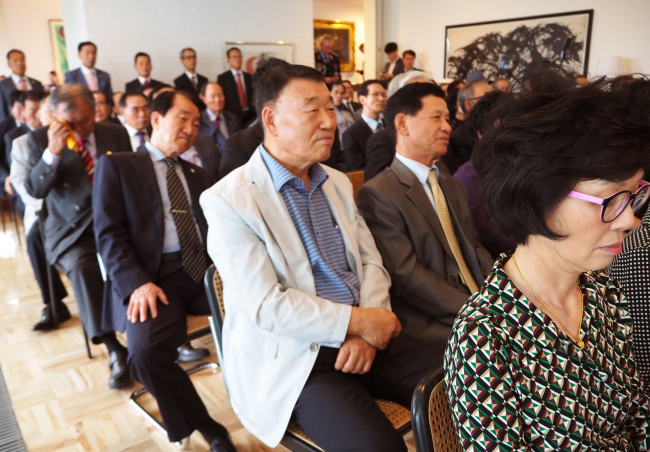 |
Korean miners and nurses to West Germany in the 1960s and ‘70s recall their days at a reception marking their legacies at the German ambassador’s residence in Seoul on Sept. 27. (Joel Lee/The Korea Herald) |
Yang landed in the border city of Aachen in North Rhine-Westphalia in December that year. The group of 124 men he came with were the first batch of Koreans who would toil in West German coal mines to help fuel the two countries’ industrial take-off.
Yang -- currently the president of the Association of Korean Workers to Germany -- said when he heard the news, he didn’t even know it was an actual mining job. The advert simply promised a “technical apprenticeship” related to mining, the outcome of a labor agreement between the two governments in 1963.
“I would work 7 hours a day on a three-part rotational shift, 1,000-meters underground. The temperature was above 40 degrees Celsius, everything was pitch black and deadly quiet. Debris constantly fell from the ground tunnel’s ceiling,” he said. “You had to carry a 2-3 liter bucket of water and some food. The tenderfoots drank all that water instantly, but you had to learn to drink sip-by-sip to save water and keep going for hours.”
West Germany was in the midst an industrializing boom later known as the “miracle on the Rhine.” That economic growth was powered by coal from the country’s mines.
As virtually every coal deposit had to be dug, the Korean men who were shorter than Europeans grafted in tunnels as little as 1 meter in height, kneeling, creeping and crawling as they dug.
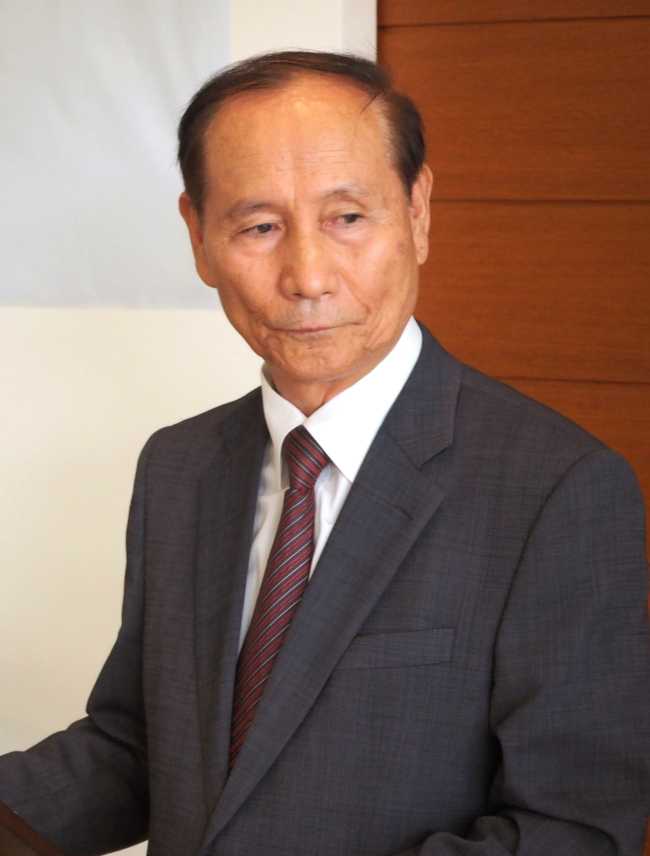 |
Yang Dong-yang, president of the Association of Korean Workers to Germany (Joel Lee/The Korea Herald) |
The mine deposits were aligned horizontally underground, he said, adding that laborers had to descend more than a kilometer in an elevator and move for another two kilometers horizontally on a lorry to individual working stations.
“We worked with the Turks, Spanish and Italians who were physically bigger than us. We used a large drilling machine resembling a machine gun to bore into the wall. Broken coal pieces would fall, and you shoveled them into carts on a rotating belt.”
Miners advanced parallel in separate tunnels three to four meters wide, installing horizontal and vertical columns buttressed by rafters every few meters.
“The work was so dangerous, and deaths came stealthily. Many of my coworkers died or got injured,” Yang recalled. “When a partner died beside you in the tunnel’s pitch blackness and deathly calm, you didn’t even realize. The dead body got transported back and you would only meet his death later outside through word of mouth. Mindful of the danger, I simply had to carry on.”
Yang studied night and day in the first year to improve his German language skills. He came to feel comfortable communicating in German in the second year, and after switching to an easier line of work interpreting between Korean and German workers in the third year, registered at the RWTH Aachen University’s undergraduate program in architecture.
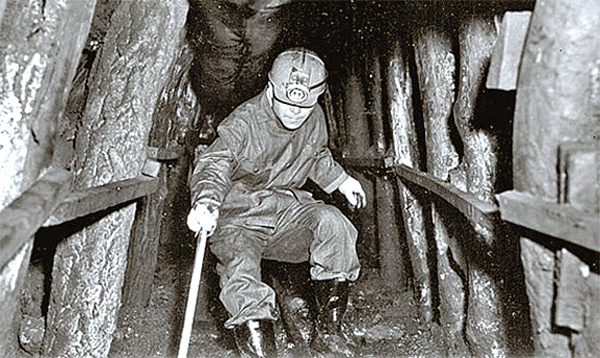 |
A Korean miner in West Germany (Kim Jong-pil) |
Over the next 9 years, Yang would pursue both work and study. He saved most of the money earned and sent it home. He eventually obtained a doctorate in urban planning at the same university -- becoming Korea’s first Ph.D. in the field from Europe -- and came back to Korea in 1982 to teach at Korea University sponsored by the government, where he taught for 20 years.
During the reception at the residence of German Ambassador Stephan Auer, organized annually to commemorate the 20,000 Korean miners and nurses dispatched to West Germany from 1963 to 1977, Yang thanked the German government for “never forgetting” their sacrifices.
“It’s already been more than a half a century since we went to West Germany. We worked bravely under difficult circumstances, but also learned and gained a lot during those arduous days,” he told a group of some 80 men and women in their mid-to-late 70s, some of them weeping as he spoke. Several leading Korean politicians were also in attendance.
“We met our spouses there, started new families, gave birth to our children and made small fortunes through honest and hard work. We also acquired technical skills and academic knowledge. But most valuably, we absorbed Germany’s democratic culture and humanitarian, socialistic norms -- values we wholehearted shared with Koreans after returning home.”
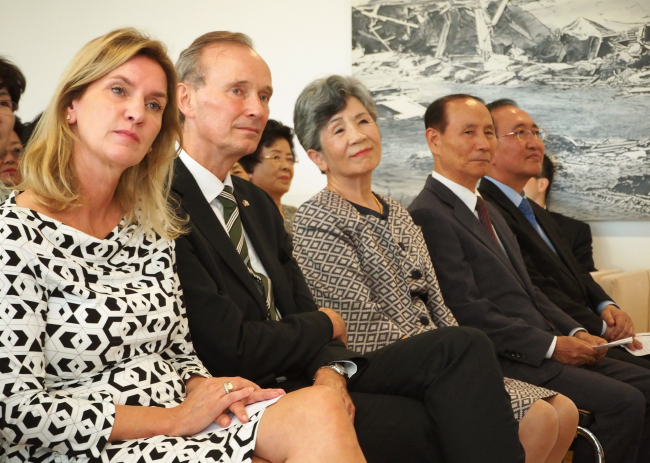 |
German Ambassador to Korea Stephan Auer (second from left) sits beside Yang Dong-yang, president of the Association of Korean Workers to Germany (second from right), and Yoon Haeng-ja Fischer (center), president of the Association of Korean Nurses to Germany, at a reception marking the miners and nurses at his residence in Seoul on Sept. 27. (Joel Lee/The Korea Herald) |
About one-third of the workers -- 6,000 to 7,000 -- came back to Korea, while the other two-thirds have either stayed in Germany or moved to the United States, Canada and elsewhere, he said.
“The Korean miners and nurses have become ambassadors for the two countries and societies. Our government deeply appreciates their sacrifices and contributions,” said Auer, also acknowledging instrumental roles they played in the two countries’ rapid economic development.
“But what’s often missed in the coverage and awareness of their contributions is that they had to adapt to an entirely new culture and society, language, food and working environment, while holding close to their hearts a nostalgia and patriotism for their motherland.”
Noting that roughly half of the nurses stayed in Germany, becoming the bridge between the German and Korean communities, the diplomat said there are currently more than 30,000 ethnic Koreans in his country, the largest Korean community in Europe, which he argued was “not a coincidence.”
Their children, now in their mid-40s and above, have grown up in a reunified and integrating Germany and achieved professional success around the world, the envoy highlighted, adding they, too, have played a crucial role in undergirding people-to-people ties.
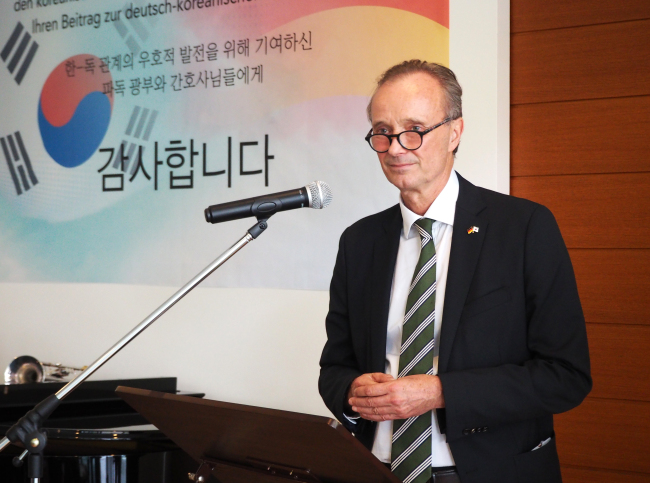 |
German Ambassador to Korea Stephan Auer (Joel Lee/The Korea Herald) |
Yoon Haeng-ja Fischer, 74, was a young single mother of two babies when she made the fateful decision to come to Germany as a nurse in 1969. One of some 12,000 Korean nurses and nursing aides assigned to 452 hospitals across the country, Yoon went to a hospital in the city of Bochum in North Rhine-Westphalia, where she worked for 38 years before retiring.
“Because I had lived such an indigent and meager life in Korea, I didn’t think my new living in Germany was anything particularly difficult,” she said in an interview. “Rather, I thought Germany had given me a golden opportunity not to be missed.”
The nurses worked tirelessly to spread a positive image of Korea in German society, the president of the Association of Korean Nurses to Germany stressed, saying they came to be known as “angels in the white gown” who exuded “jeong,” a Korean term for unassuming affection.
Yoon, who didn’t speak a word of German before landing in the unfamiliar territory, wrote 10 new words and expressions on a piece of paper each day, memorizing and speaking them out loud while interacting with her patients. Her command of vocabulary and expressions increased by the hundreds every month, and she felt comfortable in Germany after only six months.
Yoon initially earned 600 marks ($400) a month, out of which she spent 30 marks and sent the rest back to her family and extended relatives in Korea.
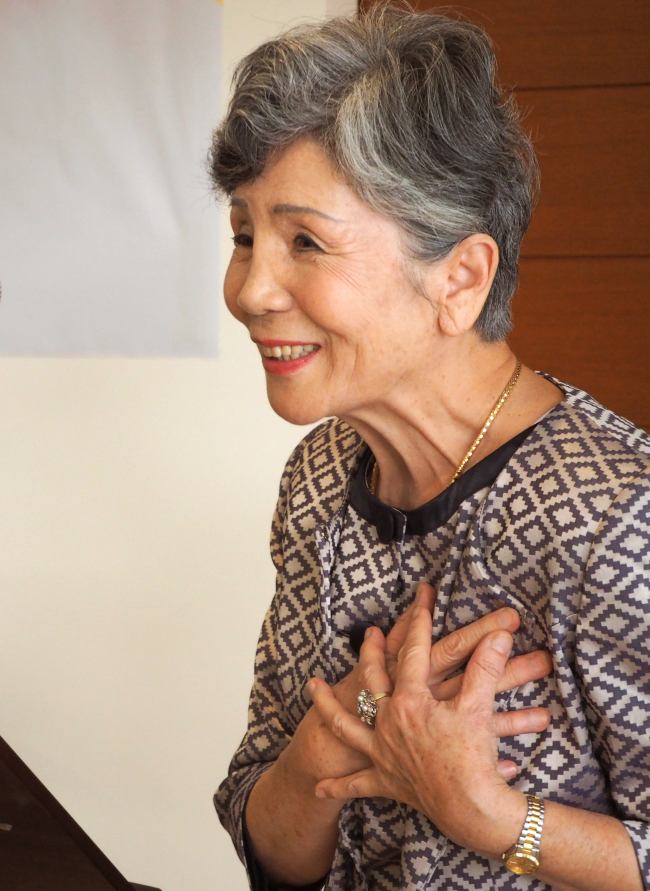 |
Yoon Haeng-ja Fischer, president of the Association of Korean Nurses to Germany (Joel Lee/The Korea Herald) |
“My salary was equivalent to a Korean government minister’s earnings, roughly 8 to 9 times that of a public servant,” she said. “I invited my children to Germany after 3 years at ages 5 and 3, and continued to send money for a total of 20 years.”
Yoon also thanked the German government for its historic remembrance, urging the Korean government to pay its respective duty to their legacies. While some 3,500 nurses currently reside in Germany and 3,000 have married into German families, the circumstances of the 850 miners that have stayed in Germany are dire, she said.
“Many miners’ lives are financially difficult because they sent all their money back home and couldn’t prepare for retirement,” according to the elderly lady. “The money helped their families buy homes, educate siblings and establish middle-class lives, but the miners themselves ended up poor.”
Yoon’s association assists in the provision of economic and medical aid to those miners in need in Germany through Korea’s Ministry of Health and Welfare. In front of the Korean lawmakers in attendance, she asked for continued medical support, as well as establishing a museum commemorating their legacies and listing their stories in school history textbooks.
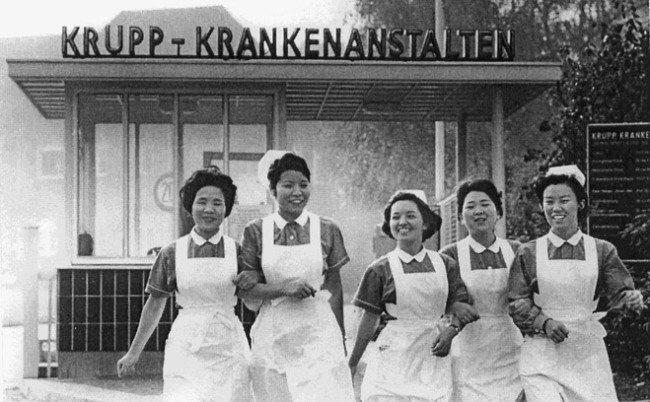 |
Korean nurses to West Germany (Immigrant Spirit) |
Yoon has educated refugees and economic migrants on how to successfully integrate into German society, and also teaches German to Korean children. She lives with her husband and two Eritrean refugees under the same roof.
“My life in Germany has taught me that people always get what they deserve in a society. Reward comes proportionally and correspondingly to your dedication,” she said, adding people work seriously in Germany from the time they come to the office until leaving out the door for home.
“I have tried hard to spread this message with the newcomers to the German society. As for my housemates, they help with gardening, taking care of my husband and various household chores, while building on their careers and education.”
By Joel Lee (
joel@heraldcorp.com)












![[Herald Interview] 'Trump will use tariffs as first line of defense for American manufacturing'](http://res.heraldm.com/phpwas/restmb_idxmake.php?idx=644&simg=/content/image/2024/11/26/20241126050017_0.jpg)
![[Exclusive] Hyundai Mobis eyes closer ties with BYD](http://res.heraldm.com/phpwas/restmb_idxmake.php?idx=644&simg=/content/image/2024/11/25/20241125050044_0.jpg)
